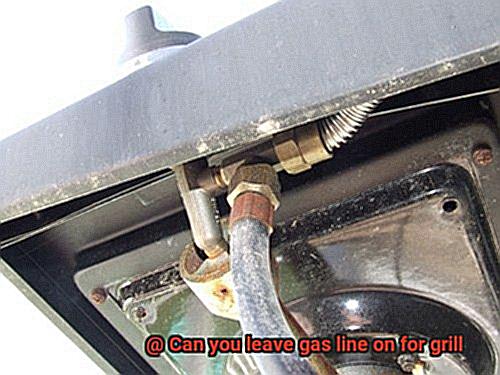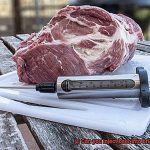Imagine this: the sun is shining, the birds are chirping, and the aroma of sizzling burgers fills the air. You’re all set for a backyard barbecue with your loved ones, but you can’t recall if it’s safe to leave the gas line on for your grill. Is it a risky move or a necessary step for an effortless grilling experience?
This question plagues both amateur and expert grillers alike. Some swear by turning off the gas line after every use, while others believe it’s perfectly fine to leave it on until the next cookout. So, what’s the deal?
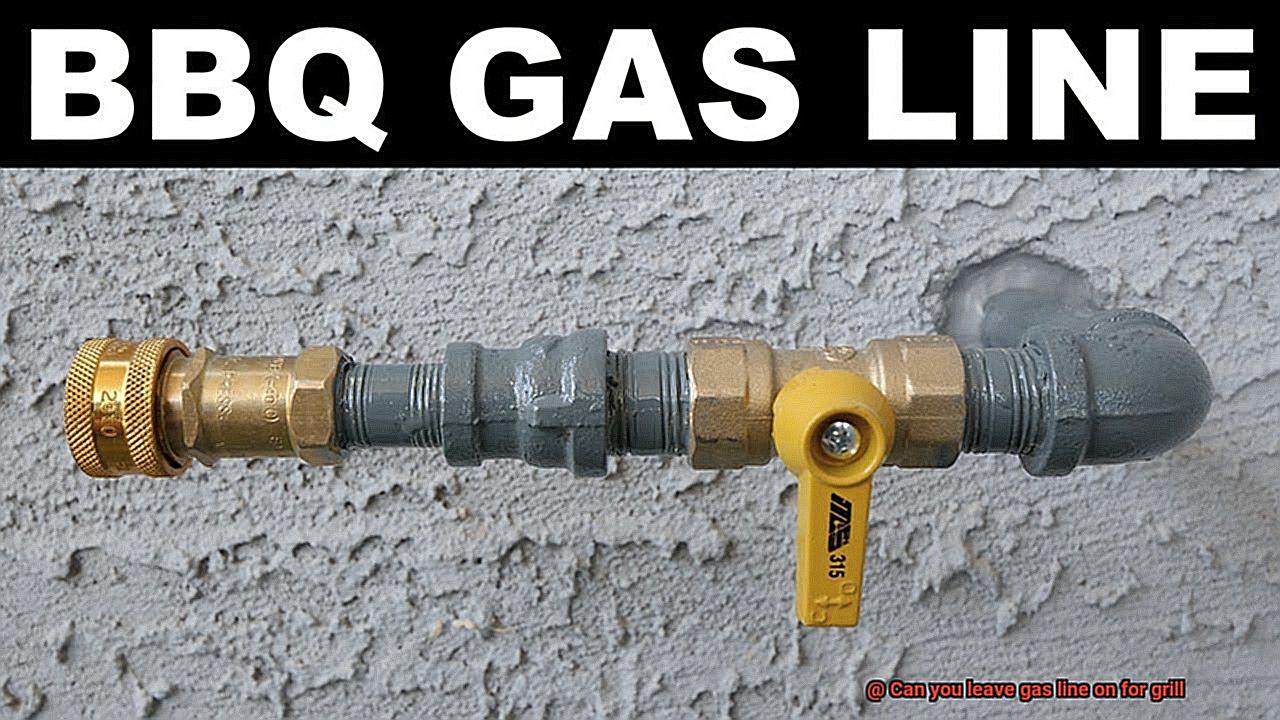
In this blog post, we’ll delve into the ins and outs of leaving your gas line on for your grill. We’ll explore potential hazards associated with keeping it on and benefits of doing so. Additionally, we’ll provide tips to ensure that your grill remains in excellent working condition whether you choose to turn off or keep the gas line on.
So, grab yourself a cold one and get ready to learn everything you need to know about leaving the gas line on for your beloved grill.
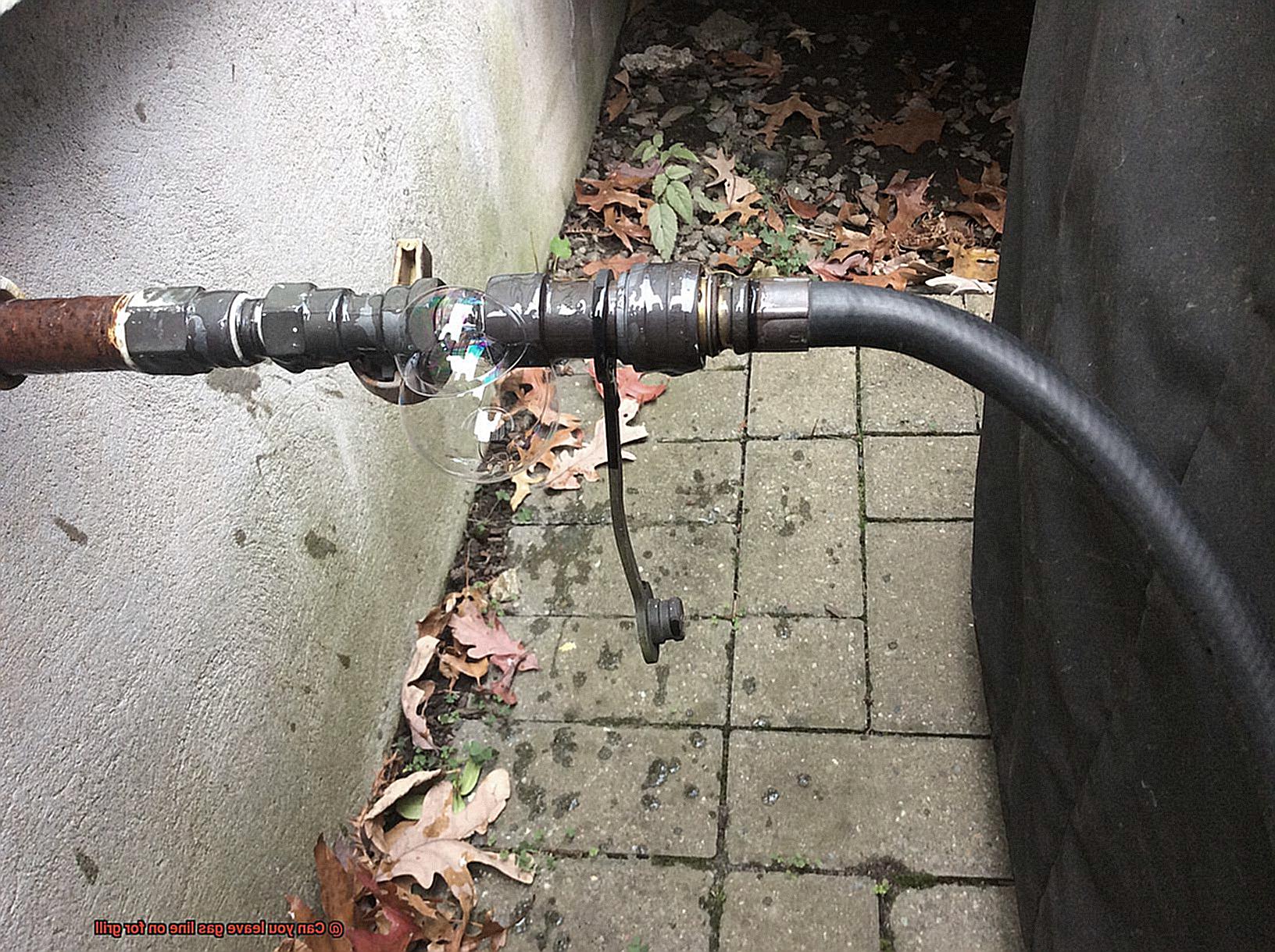
Contents
What is a Gas Line?
A gas line is an integral part of any gas-powered appliance, including grills. It refers to the pipe or tubing system that delivers gas to a specific location, such as a home or business. In the context of grilling, it is the hose or pipe that connects your propane or natural gas tank to your grill.
Natural gas is a popular fuel source for outdoor grills due to its clean-burning properties and long-term cost-effectiveness. However, not all homes have a natural gas line installed, so many people opt for propane instead.
Regardless of which type of gas you use, it is crucial to ensure that your gas line is properly installed and in good condition. Small leaks can develop in the line or connections over time, even if your grill appears to be functioning correctly. Such leaks can create an explosive situation by allowing gas to escape into the air.
To prevent this from happening, regular maintenance and inspection of your gas line are essential. Inspect the hose and connections for any signs of damage or wear and tear, such as cracks in the hose or loose connections. If you notice any issues, address them promptly and replace any damaged parts as soon as possible.
The gas line for a grill consists of a hose that runs from the propane tank or natural gas line to the grill’s regulator. The regulator controls the flow of gas and ensures that it is at the correct pressure for safe use with the grill.
While it is generally safe to leave the gas line on while cooking on your grill, it is highly recommended that you turn it off when you are finished. This not only helps conserve fuel but also reduces the risk of any accidents occurring in the event of an unexpected flare-up or other mishap.
Why Shouldn’t You Leave the Gas Line On?
This convenience can come at a steep price. Here are three reasons why you shouldn’t leave the gas line on for your grill.
First and foremost, leaving the gas line on is incredibly dangerous. Even a small leak can lead to a massive fire or explosion if there’s any spark or ignition source. This can cause severe damage to your property and put the lives of those around you at risk. It’s always better to err on the side of caution and turn off the gas supply when you’re done grilling.
Another reason to turn off the gas supply is that it saves valuable resources and money. Gas is not an infinite resource, and every time you leave it on unnecessarily, you’re running up your utility bills. Additionally, it puts unnecessary wear and tear on your grill’s components, which could lead to costly repairs or replacements in the future.
Lastly, leaving the gas line on can attract unwanted pests such as insects and rodents. These creatures are attracted to the smell of natural gas and can make themselves at home in your grill, causing damage to its components. To avoid this problem, make sure to turn off the gas supply after using your grill.
Potential Risks Associated with Leaving the Gas Line On
However, it’s important to remember that grilling also involves handling potentially dangerous equipment that should never be taken for granted. One such example is leaving the gas line on for your grill. While it may seem like a small mistake, it can lead to significant risks that could put you and your loved ones in danger.
The potential risks associated with leaving the gas line on are vast and varied. One of the most significant risks is the risk of fire. If the gas line is left on and there is no flame, gas can build up in the grill and surrounding area, creating a dangerous situation if there is an ignition source nearby, such as a spark from a lighter or a carelessly tossed cigarette.
However, the risk of explosion is even more serious. If the gas builds up enough, it can explode, causing serious damage to property and potentially injuring people nearby. This risk is especially high if there is a leak in the gas line or if the grill has not been properly maintained. The consequences of an explosion can be catastrophic and far-reaching.
But did you know that leaving the gas line on can also lead to gas poisoning? The buildup of gas in enclosed spaces can cause headaches, dizziness, nausea, and even death in severe cases. This risk is particularly high for those who have respiratory issues or are sensitive to gas fumes. It’s crucial to avoid this kind of risk at all costs.
To avoid any potential risks associated with leaving the gas line on, there are a few precautions you can take. Firstly, always make sure to turn off your gas supply when you’re done grilling. Secondly, inspect your grill and gas line regularly for any signs of damage or leaks. And lastly, ensure proper ventilation when grilling in enclosed spaces. By taking these simple steps, you can protect yourself and your loved ones from any potential harm and enjoy outdoor cooking safely and without incident.
How to Safely Turn Off the Gas Line
Grilling is a popular pastime enjoyed by many, but it’s crucial to prioritize safety when operating a gas grill. Turning off the gas line when you’re finished cooking is an essential step in ensuring safety. Here are the steps you need to follow to safely turn off the gas line for your grill:
Locate the shutoff valve
The shutoff valve is usually located near the grill or on the gas line itself. It’s vital to know where this valve is so that you can quickly and easily shut off the gas supply if necessary.
Turn the valve clockwise
Once you’ve located the shutoff valve, turn it 90 degrees to the right to close off the gas supply. This action will prevent gas from flowing into your grill when not in use, reducing the risk of an explosion.
Check for leaks
After turning off the gas supply, always check for any signs of leaks. Sniff around for gas odors and inspect the gas line and grill components for visible damage or wear. If you suspect a leak, do not try to turn off the gas supply yourself. Instead, evacuate the area and call your local fire department or gas company immediately.
Maintain and inspect your grill
Proper maintenance and inspection are critical in preventing potential hazards. Check for leaks regularly, clean your grill after each use, and follow manufacturer instructions for use and maintenance.
Signs of a Leak in Your Grill or Gas Line
Grilling is a beloved pastime for many, but it’s important to prioritize safety when cooking with gas. One of the biggest safety concerns is the possibility of a gas leak in your grill or gas line. Fortunately, knowing the telltale signs of a leak can prevent accidents and protect you and your loved ones.
The first and most obvious sign of a gas leak is the smell of gas. Natural gas and propane have a distinct odor added to them so that they can be easily detected in case of a leak. If you catch a whiff of gas near your grill, don’t hesitate, turn off the gas immediately, and check for any visible leaks. Don’t even think about lighting the grill or doing anything that could cause a spark.
Another sign of a gas leak is hissing or whistling sounds coming from your grill or gas line. These strange noises could indicate an issue with the connections or valves in your system. If you hear any unusual sounds, turn off the gas and inspect your grill and gas line for any leaks.
Visible damage to your grill or gas line is another indication of a potential leak. Check for any cracks, holes, or other damage that could be causing a leak. It’s best to replace any damaged parts as soon as possible to avoid further risks.
Lastly, if you notice that your grill isn’t heating up properly or if the flame is weak or yellow instead of blue, it could be a sign of a gas leak. This could be due to an obstruction in the gas line caused by a leak.
Regular Maintenance Tips for Your Grill
Grilling is a popular way to cook food and enjoy the outdoors, but it’s important to prioritize safety by regularly maintaining your grill. Not only does regular maintenance help ensure your grill lasts for many years, but it also prevents dangerous accidents. Here are five crucial tips to keep your grill functioning safely and efficiently:
Turn off the Gas Line
After each use, make sure to turn off the gas line by closing the valve on the propane tank or natural gas line. Leaving the gas line on can lead to gas leaks, fires, and even explosions. It’s also essential to check the hoses and connections regularly for any signs of wear or damage. If you notice any issues, replace them immediately.
Clean Your Grill
Grease and food debris can build up on the grates and inside the grill, leading to flare-ups and damage. Clean the grates after each use with a wire brush and remove any debris from inside the grill. Deep clean your grill occasionally by removing the grates and cleaning them thoroughly with soap and water.
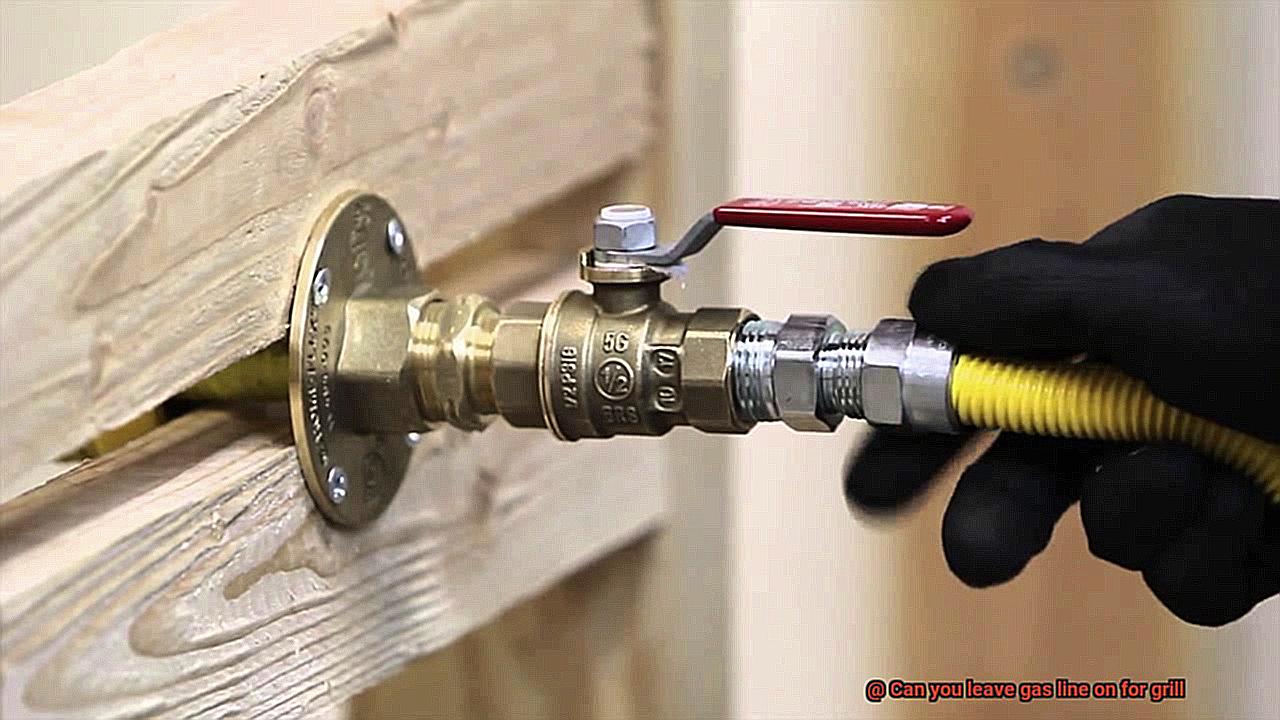
Store Your Grill Properly
Cover your grill with a waterproof cover and store it in a dry location during the offseason to prevent rust and damage.
Inspect Your Grill Regularly
Check your grill regularly to ensure it’s functioning properly and safely. Look for signs of damage or leaks in the gas line, hoses, and connections. If you notice any issues, immediately turn off the gas and contact a professional for repair.
Replace Worn Parts
Over time, parts of your grill may wear down or become damaged. Replace these parts as soon as possible to prevent accidents or further damage to your grill.
How to Disconnect the Gas Line from Your Grill
Grilling is a beloved pastime for many during the summer months, but it’s essential to prioritize safety while doing so. One crucial safety measure is to disconnect the gas line from your grill when it’s not in use. Here are five steps you can follow to safely disconnect the gas line from your grill.
Step 1: Turn off the gas supply valve
The first step is to turn off the gas supply valve located near the propane tank or natural gas line. This valve controls the flow of gas into your grill, and turning it off will prevent any gas from flowing into the grill while you disconnect the gas line.
Step 2: Release pressure from the gas line
Before disconnecting the gas line, release any pressure that may have built up in the gas line. You can do this by turning on the burners and allowing them to run for a few minutes until they go out on their own. This step ensures that there is no pressure in the gas line, making it safer to disconnect.
Step 3: Disconnect the hose from the regulator
Next, locate the coupling nut that connects the gas line to the regulator. Turn the nut counterclockwise until it comes loose, and then pull the hose away from the regulator. This step will disconnect your grill from its fuel source.
Step 4: Inspect gas line for wear or damage
Once you have disconnected the gas line, inspect it for any signs of wear or damage. Check for cracks, leaks, or any other damage that could compromise its safety. If you notice any problems, replace the gas line before using your grill again.
Step 5: Store the gas line safely
After disconnecting the gas line, store it in a safe place away from any potential heat sources or flames. This step ensures that your gas line is not damaged or compromised in any way while not in use.
_lXcNrYHNlY” >
Conclusion
To sum it up, leaving your gas line on for grilling may seem like a convenient option, but it can pose significant risks such as fire, explosion, and gas poisoning. As a responsible griller, it’s always better to err on the side of caution and turn off the gas supply after use.
Regular maintenance and inspection of your gas line are crucial in preventing small leaks from developing over time. It’s also essential to inspect your grill and gas line regularly for any signs of wear or damage.
Disconnecting your gas line safely involves several steps, including turning off the gas supply valve, releasing pressure from the line, disconnecting the hose from the regulator, inspecting for damages or wear and tear before storing it away safely from heat sources or flames.
By prioritizing safety when operating a gas grill and following these simple steps, you can ensure that you and your loved ones enjoy outdoor cooking without any potential harm.

